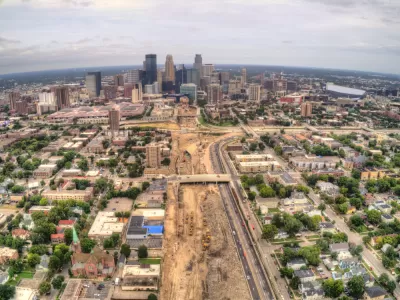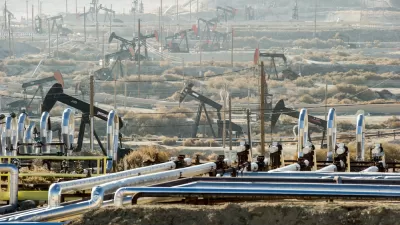After Minnesota's new Democratic Gov. Tim Walz proposed a 20-cents gas tax hike over two years, even leaders in his own party were caught off-guard, but one-third of the tax increase will replace the diversion of general funds to roads.

"In pitching his plan, Gov. Tim Walz is unapologetic about what would be a big jump to the existing 28.5-cents tax on each gallon," states Brian Bakst in the audio version accompany his March 6 article for Minnesota Public Radio News.
"This is not a choice between having a gas tax or not," he said.
"It's a choice between living in a state with the best and safest transportation system in the country or living in a state with crumbling roads and bridges that risk our safety and keep away businesses."
While Republican legislative leaders, particulars those who control the Senate, were quick to seize on the size of the increase, some members of the Democratic–Farmer–Labor Party (DFL) were apparently caught off-guard.
"It's kind of sticker shock when you hear 20 cents right there," said House Tax Committee Chair Paul Marquart, DFL-Dilworth.
The main thrust of Bakst's piece is that rather than rather than looking at a 20-cents tax increase, similar to New Jersey's 23-cents per gallon gas tax increase, which took effect Nov. 1, 2016, it should be framed as four separate gas tax increases of five-cents per gallon, according to Marquart.
As proposed, additions to the tax would be spread out through 5-cent-a-gallon bumps — the first this September and the rest spread paced out about every six months. After that, Walz wants to connect the tax to some measure of inflation.
Gas tax hike would benefit all state programs, not just transportation
Gas tax revenues "are constitutionally dedicated to roads, bridges and some connected costs, such as the highway patrol," notes Bakst.
Transportation Commissioner Margaret Anderson Kelliher estimates that about 5 to 6 cents of the proposed 20-cent boost would get projects to ease congestion and improve safety features done more quickly.
She said 7 cents would be used to swap out transportation spending that now comes out of the general treasury, freeing up $450 million for other state-backed programs. The rest, she said, would pay off past highway borrowing or support new bonds.
The budget would "increase transportation funding for roads and bridges in counties and cities by 35 percent with much of that paid for with his gas tax hike," according to Bakst's earlier coverage of the Feb. 19 budget proposal which also includes higher registration fees and vehicle sales taxes.
As posted on Jan. 24, the ultimate size of the gas tax hike, should Walz be successful, may very well be half of what he proposed, as Marquart suggested to Bakst. Also noted in the earlier post was the chronology of former Republican Gov. Tim Pawlenty's three vetoes of legislative gas tax hikes in 2005, 2007, and 2008, with the legislature overriding the final veto, resulting in the last time the legislature agreed to hike the gas tax.
Other states to watch
"Gas tax proposals are on the table this year in Wisconsin, which has a Democratic governor, and Ohio, whose government is led by a Republican," adds Bakst.
Already approved increases will take effect this summer in Rhode Island, South Carolina (see post) and Tennessee (posted here)."
Related in Planetizen:
-
Major Bus Transit Investments Proposed for Minnesota, February 26, 2019
-
New Minnesota Governor Prepares for Gas Tax Hike Battle, January 24, 2019
Hat tip to Bill Cramer, IBTTA Tolling Points.
FULL STORY: 20 cents vs. four nickels: Messaging matters in gas tax debate

Planetizen Federal Action Tracker
A weekly monitor of how Trump’s orders and actions are impacting planners and planning in America.

San Francisco's School District Spent $105M To Build Affordable Housing for Teachers — And That's Just the Beginning
SFUSD joins a growing list of school districts using their land holdings to address housing affordability challenges faced by their own employees.

The Tiny, Adorable $7,000 Car Turning Japan Onto EVs
The single seat Mibot charges from a regular plug as quickly as an iPad, and is about half the price of an average EV.

With Protected Lanes, 460% More People Commute by Bike
For those needing more ammo, more data proving what we already knew is here.

In More Metros Than You’d Think, Suburbs are Now More Expensive Than the City
If you're moving to the burbs to save on square footage, data shows you should think again.

The States Losing Rural Delivery Rooms at an Alarming Pace
In some states, as few as 9% of rural hospitals still deliver babies. As a result, rising pre-term births, no adequate pre-term care and "harrowing" close calls are a growing reality.
Urban Design for Planners 1: Software Tools
This six-course series explores essential urban design concepts using open source software and equips planners with the tools they need to participate fully in the urban design process.
Planning for Universal Design
Learn the tools for implementing Universal Design in planning regulations.
Smith Gee Studio
City of Charlotte
City of Camden Redevelopment Agency
City of Astoria
Transportation Research & Education Center (TREC) at Portland State University
US High Speed Rail Association
City of Camden Redevelopment Agency
Municipality of Princeton (NJ)





























